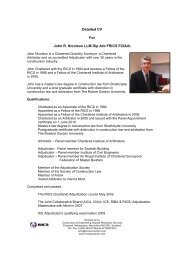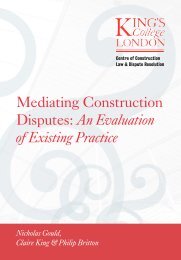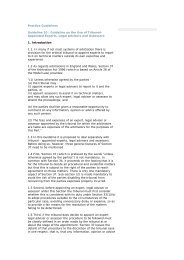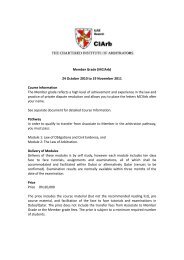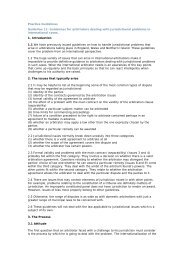14. Guideline on peremptory and unless orders
14. Guideline on peremptory and unless orders
14. Guideline on peremptory and unless orders
Create successful ePaper yourself
Turn your PDF publications into a flip-book with our unique Google optimized e-Paper software.
Practice <str<strong>on</strong>g>Guideline</str<strong>on</strong>g> 14: <str<strong>on</strong>g>Guideline</str<strong>on</strong>g>s for Arbitrators <strong>on</strong> how to approach an applicati<strong>on</strong> for aPeremptory <strong>and</strong> ‘‘Unless’’ Orders <strong>and</strong> related matters1. Introducti<strong>on</strong>1.1 One of the purposes of the Arbitrati<strong>on</strong> Act 1996 (the Act) was to deal with theperennial problem of ensuring, so far as possible, that parties comply with procedural <strong>orders</strong>made by the arbitral tribunal. Broadly speaking it does this by providing that, <strong>on</strong>ce there hasbeen an initial breach of a procedural order without sufficient cause, the tribunal may makea ‘‘<strong>peremptory</strong> order’’ to the same effect prescribing an appropriate time for compliance<strong>and</strong> that, if that order is not complied with, then the tribunal may apply certain prescribedtypes of sancti<strong>on</strong> or an applicati<strong>on</strong> may be made to the court.1.2 The following general points should be noted:1.2.1 The main provisi<strong>on</strong>s of the Act dealing with <strong>peremptory</strong> <strong>orders</strong> are Secti<strong>on</strong> 41(5)–(7)<strong>and</strong> Secti<strong>on</strong> 42. These provisi<strong>on</strong>s are not m<strong>and</strong>atory <strong>and</strong> so parties are free to c<strong>on</strong>tract outof them or to provide their own machinery for ensuring compliance with <strong>orders</strong> of thetribunal <strong>and</strong> sancti<strong>on</strong>s for breach of them.1.2.2 The typical sancti<strong>on</strong>s for breach of a procedural order made by arbitrators are thoseset out in Secti<strong>on</strong> 41(7) such as directing that the party in default shall not be entitled to relyup<strong>on</strong> any allegati<strong>on</strong> or material which was the subject of the order. This is a useful tool toenable arbitrators to police compliance with their procedural <strong>orders</strong>. But there is a potentialtensi<strong>on</strong> between the duty of an arbitrator to ensure that a dispute is resolved withoutunnecessary delay <strong>and</strong> his duty under Secti<strong>on</strong> 33(1) to give each party a reas<strong>on</strong>ableopportunity of putting its case. The success or otherwise of the arbitrator in dealing withdilatory or recalcitrant parties will be judged by the success with which he has rec<strong>on</strong>ciled thetwo, sometimes c<strong>on</strong>flicting, objectives.1.2.3 Secti<strong>on</strong> 41 also deals with two other topics, namely (a) inordinate <strong>and</strong> inexcusabledelay <strong>on</strong> the part of the claimant in pursuing its claim (Secti<strong>on</strong> 41(3)); <strong>and</strong> (b) the power of atribunal to proceed following the failure of the resp<strong>on</strong>dent to attend an oral hearing or tosubmit written evidence or submissi<strong>on</strong>s (Secti<strong>on</strong> 41(4)). The latter topic has been discussed
2.2.5 A <strong>peremptory</strong> order must be made ‘‘to the same effect’’ as the original order. Itshould track the earlier order precisely. It should not introduce anything new.2.2.6 It should prescribe a time for compliance <strong>and</strong> that time should be reas<strong>on</strong>able giventhe practicalities which are relevant to the particular step which has to be taken.2.2.7 It is wise to state expressly somewhere in the order (e.g. in the heading) that it is a<strong>peremptory</strong> order. Alternatively the order should state that it has been made under Secti<strong>on</strong>41(5).3. ‘‘Unless’’ Orders3.1 The practice with regard to <strong>peremptory</strong> <strong>orders</strong> granted in the High Court is for theorder to provide that, <strong>unless</strong> it is obeyed within a given time, <strong>on</strong>e or more specifiedc<strong>on</strong>sequences will follow automatically. An order in this form is known as an ‘‘<strong>unless</strong> order’’.3.2 In the c<strong>on</strong>text of arbitrati<strong>on</strong> an ‘‘<strong>unless</strong>’’ order can be regarded as simply <strong>on</strong>e formof <strong>peremptory</strong> order. There is, however, a distincti<strong>on</strong> between an order which provides that,<strong>unless</strong> it be obeyed, a particular c<strong>on</strong>sequence ‘‘shall’’ follow <strong>and</strong> <strong>on</strong>e which provides that aparticular c<strong>on</strong>sequence ‘‘may’’ follow so that, if the order be not complied with, thearbitrator must c<strong>on</strong>sider again whether the proposed sancti<strong>on</strong>, or some modificati<strong>on</strong> of it, isappropriate.3.3 The sec<strong>on</strong>d type of ‘‘<strong>unless</strong> order’’ is authorised by Secti<strong>on</strong> 41 (5), whereas the firstis not. It is therefore recommended that, wherever possible, a <strong>peremptory</strong> order shouldstate what sancti<strong>on</strong> may apply in case of n<strong>on</strong>-compliance but that the questi<strong>on</strong> of whetherto impose that sancti<strong>on</strong> or perhaps an amended versi<strong>on</strong> of the sancti<strong>on</strong>, should be finallydetermined after n<strong>on</strong>-compliance with the <strong>peremptory</strong> order has occurred.3.4 A procedure of issuing an ‘‘<strong>unless</strong>’’ order in this form has the advantages: (a) thatthe arbitrator, before issuing the <strong>peremptory</strong> order, can c<strong>on</strong>sider whether it can achieve auseful purpose <strong>and</strong> can indicate, <strong>on</strong> a provisi<strong>on</strong>al basis, what sancti<strong>on</strong> is appropriate <strong>and</strong> notinc<strong>on</strong>sistent with his duty under Secti<strong>on</strong> 33(1) <strong>and</strong> (b) that the defaulting party cannot latersay that it had not been warned of the possible c<strong>on</strong>sequence of n<strong>on</strong>-compliance.4. Sancti<strong>on</strong>s4.1 The Act provides separately for the sancti<strong>on</strong>s which may be applied: (a) for breach ofa <strong>peremptory</strong> order to provide security for costs; Secti<strong>on</strong> 41(6); <strong>and</strong> (b) for breach of other
kinds of <strong>peremptory</strong> order: Secti<strong>on</strong> 41(7). It also provides that, <strong>unless</strong> otherwise agreed bythe parties, the court may make an order requiring a party to comply with a <strong>peremptory</strong>order made by the tribunal: Secti<strong>on</strong> 42.4.2 Orders for security for costs4.2.1 The <strong>on</strong>ly sancti<strong>on</strong> prescribed by the Act, where a claimant has failed to comply witha <strong>peremptory</strong> order of the tribunal to provide security for costs, is that: ‘‘the tribunal maymake an award dismissing his claim’’. This topic is dealt with in the <str<strong>on</strong>g>Guideline</str<strong>on</strong>g> <strong>on</strong> ‘‘MakingOrders Relating to the Costs of the Arbitrati<strong>on</strong>’’. The following points should be noted:4.2.2 The sancti<strong>on</strong> is not a procedural stay of the arbitrati<strong>on</strong> but ‘‘an award dismissing his(the claimant’s) claim’’. The disadvantage of a stay is that it would leave the arbitrati<strong>on</strong>dormant but alive so that years later it could be revived by the provisi<strong>on</strong> of security. TheDepartmental Advisory Committee (DAC) preferred the sancti<strong>on</strong> of an award which can bechallenged (e.g. if a party seeks to c<strong>on</strong>tinue the proceedings); see DAC Report of February1996, para.198. There is, however, nothing to prevent a tribunal granting an informal <strong>and</strong>temporary stay before the stage of dismissal arises, as by extending the time for the nextstage of the arbitrati<strong>on</strong>.4.2.3 Dismissal of a claim is of course a drastic measure not to be imposed lightly. It is,however, the c<strong>on</strong>sequence of any order for security that if the security be not provided thenin the end the claim may have to be struck out. That potential c<strong>on</strong>sequence should havebeen fully taken into account before the original order was made.4.2.4 The procedure laid down by the Act provides for the enforcement of an order forsecurity in defined stages. First there should be an initial order which specifies anappropriate deadline for the provisi<strong>on</strong> of the security which is being ordered. Sec<strong>on</strong>dly,there must be a failure to comply with that order <strong>and</strong> the party in default must have failedto show sufficient cause for its default. Thirdly, the tribunal must have made a <strong>peremptory</strong>order ‘‘to the same effect’’ as the original order but prescribing a later appropriate date forcompliance. Fourthly there must have been a failure by the claimant to comply with the<strong>peremptory</strong> order.4.2.5 Once that stage has been reached, the tribunal has a discreti<strong>on</strong> to make an awarddismissing the claim. In practice, while the tribunal may properly allow extra time forcompliance, there will come in the end a stage where the <strong>on</strong>ly order which is fair <strong>and</strong> which
does not infringe the purpose of the original order is that of dismissal of the claimant’sclaim. It should be borne in mind that until a stay is ordered or the claim is dismissed theresp<strong>on</strong>dent may incur costs <strong>and</strong> these may be irrecoverable.4.3 Sancti<strong>on</strong>s for breach of other kinds of <strong>peremptory</strong> order4.3.1 The sancti<strong>on</strong>s available for breach of other kinds of <strong>peremptory</strong> order do not includea drastic remedy such as dismissal of a claim. An arbitrator has no power to issue theequivalent of a default judgment. Secti<strong>on</strong> 41(7) enables the tribunal to do any of thefollowing:‘‘(a) direct that the party in default shall not be entitled to rely up<strong>on</strong> any allegati<strong>on</strong> ormaterial which was the subject matter of the order;(b) draw such adverse inferences from the act of n<strong>on</strong>-compliance as the circumstancesjustify;(c) proceed to an award <strong>on</strong> the basis of such materials as have been properly provided to it;(d) make such order as it thinks fit as to the payment of costs of the arbitrati<strong>on</strong> incurred inc<strong>on</strong>sequence of the n<strong>on</strong>-compliance.’’4.3.2 Proporti<strong>on</strong>ality <strong>and</strong> relevance are the keys to a proper applicati<strong>on</strong> of these powers.Thus, a failure to disclose documents relating to a particular part of a case or to give furtherinformati<strong>on</strong> as to that part of the case may be satisfactorily met by an ‘‘<strong>unless</strong> order’’ whichprovides that, <strong>unless</strong> the documents are supplied or the informati<strong>on</strong> is given, the party indefault may be disentitled to rely <strong>on</strong> that part of its case. The order should not otherwiseaffect the overall c<strong>on</strong>duct of the case. Such <strong>orders</strong> can properly be made where the burdenof establishing the particular allegati<strong>on</strong> rests <strong>on</strong> the party which is in default. The <strong>orders</strong>hould be carefully drafted so as to preclude the party in default from relying <strong>on</strong> matters inrespect of which it has failed to give proper discovery or to supply sufficient informati<strong>on</strong>without going further than is necessary to protect the party not in default.4.3.3 A comm<strong>on</strong> situati<strong>on</strong> where a <strong>peremptory</strong> order may be required is where there hasbeen a failure to serve defence submissi<strong>on</strong>s. The sancti<strong>on</strong> here, which can be incorporatedin an ‘‘<strong>unless</strong>’’ order, is that, <strong>unless</strong> the submissi<strong>on</strong>s are served by an appropriate date, thetribunal may proceed to an award <strong>on</strong> the basis of such materials as have been provided to it.However, <strong>on</strong>e particular problem that arises quite regularly is that the claimant has not infact produced with its claim submissi<strong>on</strong>s all the evidence <strong>on</strong> which it wishes to rely. If,
following the resp<strong>on</strong>dent’s failure to comply with the <strong>peremptory</strong> order, the claimant asksto be allowed to put in further evidence while expecting the tribunal to disallow theresp<strong>on</strong>dent from resp<strong>on</strong>ding, the tribunal will have to require the claimant to elect eitherthat the tribunal will proceed <strong>on</strong> the original materials or else that the resp<strong>on</strong>dent must beallowed a further opportunity to serve its defence submissi<strong>on</strong>s.4.3.4 The sancti<strong>on</strong> to ‘‘draw such adverse inferences from the act of n<strong>on</strong>-compliance asthe circumstances justify’’ does not require the making of an ‘‘<strong>unless</strong> order’’. Nor should thetribunal attempt to specify in advance what inferences may be drawn. If there has been abreach of a <strong>peremptory</strong> order, the tribunal can c<strong>on</strong>sider what inferences to draw from n<strong>on</strong>complianceat the stage of making its award. The tribunal should warn the party in defaultthat, when it comes to c<strong>on</strong>sidering its award, it may draw inferences from n<strong>on</strong>compliancewith the order.4.3.5 The sancti<strong>on</strong> of a special costs order is expressly authorised by Secti<strong>on</strong> (7)(d). Itshould be noted, however, that the costs must have been incurred ‘‘in c<strong>on</strong>sequence of then<strong>on</strong>-compliance’’. The weap<strong>on</strong> of a costs order should not properly be used as a penalty. It issometimes difficult to quantify what extra costs have been incurred as a result ofn<strong>on</strong>compliance with a procedural order.5. Modificati<strong>on</strong> of Peremptory <strong>and</strong> “Unless” Orders5.1 Whether a <strong>peremptory</strong> order specifies the sancti<strong>on</strong> which will apply in the event ofn<strong>on</strong>-compliance or not, it is comm<strong>on</strong> that arbitrators are asked to modify or revoke theorder after it has been made <strong>and</strong> the applicati<strong>on</strong> may be made before or after the time forcompliance has expired. Such applicati<strong>on</strong>s require careful treatment.5.2 The comm<strong>on</strong>est form of applicati<strong>on</strong> is <strong>on</strong>e for an extensi<strong>on</strong> of time for compliance.Here the arbitrator has to balance the competing dem<strong>and</strong>s of avoiding unnecessary delay<strong>and</strong> of giving the defaulting party a reas<strong>on</strong>able opportunity of putting its case. It is difficultto lay down hard <strong>and</strong> fast rules. One factor is whether the party in default is intenti<strong>on</strong>allyplaying for time in the hope of forcing an adjournment of a hearing. Another is whether theparty not in default will be prejudiced by allowing the defaulting party some extra time tocomply with the <strong>peremptory</strong> order. If the applicati<strong>on</strong> is made before the time for compliancehas expired, the arbitrator may be more inclined to grant an extensi<strong>on</strong> than if it has alreadyexpired. But it is not an arbitrator’s functi<strong>on</strong> to enforce discipline for its own sake <strong>and</strong> thearbitrator in a doubtful case may not wish to incur the risk of endangering the award by
arguably committing a breach of his duty under Secti<strong>on</strong> 33(1). On the other h<strong>and</strong>, if anextensi<strong>on</strong> will cause prejudice to the innocent party he will be more ready to refuse anextensi<strong>on</strong>.5.3 It is far less comm<strong>on</strong> that an arbitrator is asked to revoke a <strong>peremptory</strong> order. Whileit cannot be said that an arbitrator has no jurisdicti<strong>on</strong> to do this, it would be a unusualcourse to take <strong>and</strong> such order should be made <strong>on</strong>ly in excepti<strong>on</strong>al circumstances.6. Powers of the Court to Enforce Peremptory Orders – Secti<strong>on</strong> 426.1 The DAC c<strong>on</strong>sidered that the court should have the power to enforce <strong>peremptory</strong><strong>orders</strong> made by an arbitral tribunal. In its view ‘‘there may well be circumstances where, inthe interests of justice, the fact that the court has sancti<strong>on</strong>s which in the nature of thingscannot be given to arbitrators (e.g. committal to pris<strong>on</strong> for c<strong>on</strong>tempt) will assist the properfuncti<strong>on</strong>ing of the arbitral process’’.6.2 There are limits <strong>on</strong> a court’s powers to enforce <strong>peremptory</strong> <strong>orders</strong>:(1) the parties must not have ‘‘otherwise agreed’’;(2) the court can <strong>on</strong>ly act if the applicati<strong>on</strong> is made by the tribunal or by <strong>on</strong>e party with thepermissi<strong>on</strong> of the tribunal or the parties have agreed that the powers of the court underSecti<strong>on</strong> 42 shall be available;(3) the court is not to act ‘‘<strong>unless</strong> it is satisfied that the applicant has exhausted any availablearbitral process in respect of failure to comply with the tribunal’s order’’;(4) no order is to be made <strong>unless</strong> the court is satisfied that the pers<strong>on</strong> to whom thetribunal’s order was directed has failed to comply with it within the time prescribed in theorder or, if no time was prescribed, within a reas<strong>on</strong>able time.6.3 It is rare that a party needs to have resort to Secti<strong>on</strong> 42. There are, however, somecases where a party may wish to take advantage of the fact that in some respects the court’spowers to compel compliance with its <strong>orders</strong> are wider than those of an arbitrator. Forexample, an arbitrator may have given directi<strong>on</strong>s under Secti<strong>on</strong> 38(4) for the preservati<strong>on</strong> ofproperty which is the subject of the proceedings <strong>and</strong> due to n<strong>on</strong>compliance a <strong>peremptory</strong>order may have been made. An arbitrator has no power directly to enforce such an orderwhereas the court has the power to enforce its <strong>orders</strong> by committal for c<strong>on</strong>tempt or bysequestrati<strong>on</strong> of the defaulting party’s assets.
6.4 It is recommended that, save in the most excepti<strong>on</strong>al circumstances, the tribunalshould not itself apply to the court under Secti<strong>on</strong> 42(2)(a). It is normally preferable to waituntil the aggrieved party seeks permissi<strong>on</strong> to apply to the court under Secti<strong>on</strong> 42(2)(b),when the tribunal should invite the defaulting party to comment before deciding whether ornot to give its permissi<strong>on</strong>.




